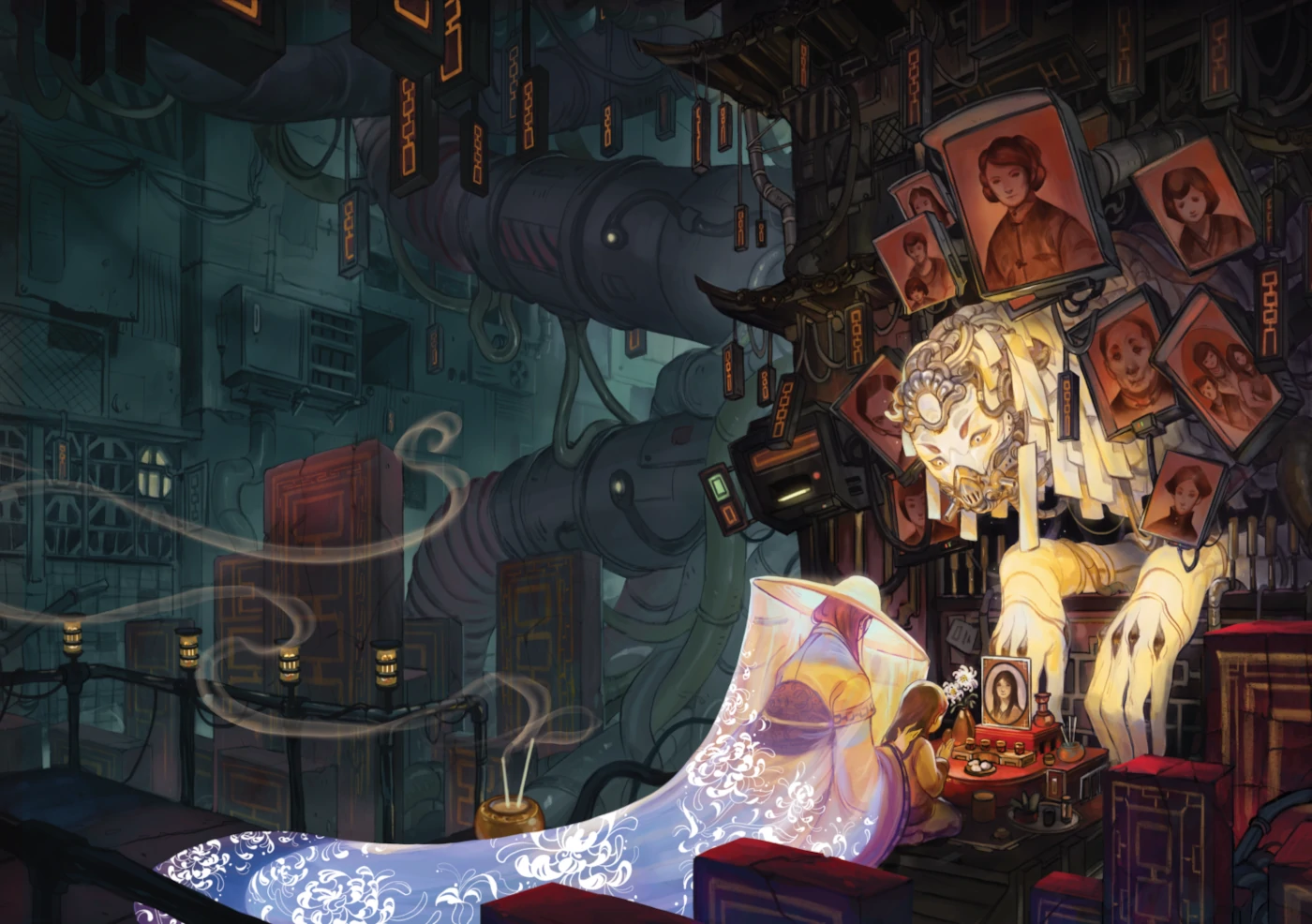
Meet Our Fall 2021 Interns!
Words By Manal Ahmed, Carter Elwood, Gina Marie Gruss, Jessenia Hernandez, and Asmaani Kumar
If you’ve ever met one of our wonderful F(r)iction staffers, you’ll quickly learn that almost every one of them was once an intern in our Publishing Internship Program.
This program is run by our parent nonprofit organization, Brink Literacy Project. While our publishing internships are a great way to get a crash course in the literary industry, they can often provide a path to what can become a long and rewarding professional relationship. For more information, please visit the internship page on the Brink website.
Manal Ahmed
she/her
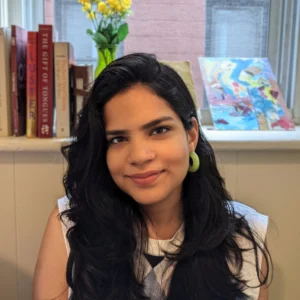
Where is your favorite place to read?
Park benches, slightly dewy grass, or my bed, when it’s cold outside. When I was much younger, I loved reading books at school during Math class. I feel like every literature kid has done that, haven’t they?
You’re walking up the side of a mountain along a winding, wooded path. You look to your left and discover, by chance, a door in the side of the mountain. Do you open it, and if so, where does it lead?
Wherever it leads, there has to be a body of water somewhere. I grew up in a city beside the sea so everywhere I go, I look for lakes, rivers, seas, and reservoirs. So, I would open the door and then sink my feet into the blue.
How do you take your coffee? If you don’t drink coffee, describe your favorite beverage ritual.
I alternate between being chai-obsessed and coffee-obsessed, depending on the season or place I’m in (chai in Karachi, coffee in Boston). I like both to be super milky; creamy and thick, but I almost always forget about my cup of chai/coffee while I’m working and then commit the cardinal sin of re-heating it throughout the day.
What is your favorite English word and why? Do you have a favorite word in another language?
I like words that sound exactly like what they are. Like glean, holler and unfurl. Or even something as simple as flower.
You’re on a deserted island. You have one album and one book. What are they and why?
Oh, that’s such a hard one. Melodrama by Lorde is one of those albums I can’t imagine life without so I would probably pick that. I also love Kartography by Kamila Shamsie. On a deserted island, it would provide me with some much-needed solace by reminding me of home because it relies so heavily on Karachi as a character.
If you could change one thing about the literary industry, what would it be?
I would make it less daunting for those that wish to enter it. There’s such a kind of mystique around it, which can be cool, but that also makes it appear so inaccessible. I simply want people to believe they can be a part of it.
Carter Elwood
they/them
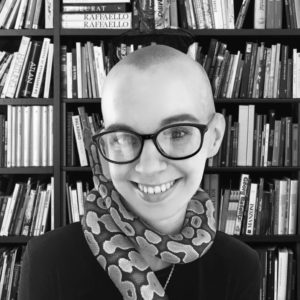
Where is your favorite place to read?
Under a big tree!
You’re walking up the side of a mountain along a winding, wooded path. You look to your left and discover, by chance, a door in the side of the mountain. Do you open it, and if so, where does it lead?
I had a dream similar to this a couple weeks ago! I was walking through tunnels in a mountain, so I think it’s safe to assume there was some kind of door I went through to get there. I climbed through the tunnels and found myself in a beautiful forest with canopy trees, iridescent flowers, and strangely haunting bird songs. A shoebill led me to a tall wooden ladder at the side of a tree. When I reached the top of the ladder, I saw a huge tortoise shell floating in the sky. I approached the shell and fell on my knees in reverence. Then about a dozen blinking tortoise heads emerged from all around the shell.
How do you take your coffee? If you don’t drink coffee, describe your favorite beverage ritual.
I don’t drink coffee, but I love smoothies! I like to add strawberries, bananas, raspberries, cantaloupe, kale—whatever I have around!
What is your favorite English word and why? Do you have a favorite word in another language?
My favorite English word is open, because I feel like the ability to remain open to our experiences and the experiences of others is crucial to moving with the flow of our lives. My favorite word in American Sign Language is peaceful/serene, which is signed the way you would sign BECOME + QUIET.
You’re on a deserted island. You have one album and one book. What are they and why?
My one album would be The Very Best of Elton John. I can never stay totally sad when listening to “Crocodile Rock.” My one book would be The Trumpet of the Swan by E.B. White, which I’ve probably read hundreds of times. I love it more every time I read it!
If you could change one thing about the literary industry, what would it be?
I would make books more accessible to marginalized communities.
Gina Marie Gruss
she/her
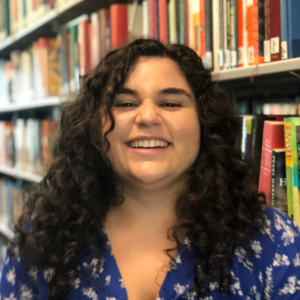
Where is your favorite place to read?
My favorite place one is on my bed, with the lights just dim enough to the point I can read clearly, the air cool, and my phone playing some ambient music to match the book. The other requirement: at least one of my two cats curled up on my lap. Apollo, my cat, often likes to bite the pages, so that only adds to the experience of action/adventure books.
My other favorite place to read is right up until sundown at the beach, when the wind picks up and the humidity fades. It’s best with friends, when we’re out of the water and a little salt-crusted from previous swims (with or without a little copper sargassum in my hair too) and the initial excitement has faded into a mutual chill. I’m someone who doesn’t mind making an impact on my books, as scandalous as it is—I write in the margins and fold pages—and I don’t mind if the book gets wet. It lets me know that I was there, and that I literally made my mark on the book, just like the book hopefully left its mark on me.
You’re walking up the side of a mountain along a winding, wooded path. You look to your left and discover, by chance, a door in the side of the mountain. Do you open it, and if so, where does it lead?
You open the door and—
See a swirling constellation of dust, the breath of achy stone and dank water, and feel a full-bodied pull, something deep within, unfathomable, telling you to step deeper into the cave, to continue, sink, sink, deeper into the heart of the mountain. You have no choice but to go in, despite the darkness, which reminds you of the sliver of shadow of your childhood bedroom’s closet, you as a kid staring, fearing, the unknown.
The walkway is lined with lights. You don’t know where they come from—no cords leading to or away from them, just one endless line above—but you don’t question it. You’re ensnared by the possibility of whatever lies ahead. Something impossible drags you forward. You’re not yourself.
But who are/were/will be you? What will your story be?
Sedimentary, metamorphic—the rocks are lined by history, by stories. You continue. The air thickens, cools. The stones change, unbecome, become; they crystalize like ice, like quartz—you can’t help yourself. You step towards them, set your hand against the wall—
You calcify. You stare inside and see your mind unfurl like an accordion, a fan, a canary in-flight, feather-fall, it shoots up and away and is majestic and gorgeous and—
Slams into a window far away. It crumples into a corpse.
You see every moment of your life both at once and separately. You see all of the options you can take, will take—and with it, the stories. Every option, every chance, every thought, immortalized into text.
You weren’t the you that you were a moment ago. This is your story, right? Who are you within it all? You return to the wall, the stone, the chances, the options.
(But—)
You’re back at the wooden doorway, the winding path. The sky shimmers. There is a deep wrongness within you. You must go back, figure yourself out, delve deeper.
You return to the stones. The heart of the mountain. You watch, repeat; are trapped in a loop of yourself, of your actions, the potential. Could you write another story? The darkness is darker than ever, deeper than ever. Your head hurts. You don’t feel the ground beneath your feet.
(Another bird crashes into a window, mistaking the panel for a strip of sky, and—)
Back again. Outside of the cave once more.
You look to look to your left and discover, by chance, a door in the side of the mountain.
You walk past it, deciding to avoid that story for now.
How do you take your coffee? If you don’t drink coffee, describe your favorite beverage ritual.
I drink almost exclusively water-sans-coffee beans. Though, around wintertime, and preferably when it feels like winter (see: south Florida), I make a big batch of hot chocolate for my yearly Friendsgiving party! Ever since I read and watched The Polar Express, I’ve been in search for the perfect hot cocoa that’s rich, but not too thick. I add a ton of warming spices like cinnamon and nutmeg (of course, taking a cue from Mexican hot chocolate); a lot of salt, some molasses, vanilla extract, and at least five different varieties of chocolate, from Dutch-process cocoa powder to milk chocolate morsels. And I toast up some mini marshmallows and add them on top, because what’s hot cocoa without the extras? During Friendsgiving, I’ll always randomly spike a cup of hot cocoa with a healthy glug of the hottest hot sauce I have as a little game, and see which friend receives their holiday gift a little early!
What is your favorite English word and why? Do you have a favorite word in another language?
Namesake is one of my favorite words. It’s partly broken down into name, what someone is known as, whether that is decided by the person themselves or someone else. Names hold power and can say a lot about a person. The other half, sake, is a reason, a cause; something that drives someone to act. Together, the word namesake is about commonality, a shared name. It’s an uncommon word but can speak of lineage, and connection/disconnection. In Spanish, namesake’s translated to tocayo—which I find to just generally be a pretty word.
You’re on a deserted island. You have one album and one book. What are they and why?
As far as music goes, my mood shifts like the tides—I’d probably take Promises by Floating Points, Pharoah Sanders, and the London Symphony Orchestra. It’s a mix of some of my favorite things: jazz, electronic, and classical music. The entire album is one piece that shifts through eight movements, all anchored by one running loop, and is truly a transformative album, focusing on liminality and stillness. It’s an album I never want to get tired of and probably won’t, even if it’s the only piece of music I have on an island.
As far as a book, for practical reasons, I’d probably pick a book that details how to live on and sail away from deserted islands, but I’d probably go for Tony DiTerlizzi’s The Search for WondLa—it’s a fantastical blend of sci-fi and fantasy in a weird, new setting. I love the use of art (and plus—maybe I judge books by their covers. Just a little.) It’s weird and experimental and everything that continues to inspire me today. The book’s themes involve exploration, self-discovery, and personal growth, which I return to even as an adult to get nostalgic, and to remind myself that I still am looking for my own WondLa. (And, if I’m trapped on a deserted island, I’m probably searching for a way off it.)
If you could change one thing about the literary industry, what would it be?
I’d love to see more diversity within the industry, both in the sense of the writers themselves coming from different (and intersectional!) points of view, as well as in the diversity in writing styles, plots, characters, and other story elements.
The true magic of creative writing, to me, is its lack of limitations—all a person needs is to be literate enough to effectively communicate and portray their piece. They can create sprawling, intergalactic epics and fantastical worlds with only text—no need to have access to CGI or actors.
I hope to see larger publishers take greater risks with who they sign on, as well as what they publish. There are so many wonderful writers and stories that are too weird, novel, and/or different that are turned down, so hopefully they’re willing to branch out and diversify the market, and in turn, show everyone that their story can be told, no matter who they are, or what they write.
Jessenia Hernandez
she/her
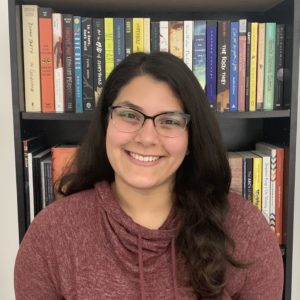
Where is your favorite place to read?
My favorite place to read is anywhere that I can get comfy, with natural light nearby to illuminate the pages. If I can find a big window to read beside, or just read outdoors on a pleasant day, I’m content. A dream of mine is to have my own book nook in my home one day, complete with a lounger beside a big window and bookshelves all around.
You’re walking up the side of a mountain along a winding, wooded path. You look to your left and discover, by chance, a door in the side of the mountain. Do you open it, and if so, where does it lead?
If I’m being honest, I’ve always been afraid of the unknown. I’ve dived headfirst into it regardless quite a few times, but I can’t say I wasn’t completely terrified of what would happen. For this reason, if I saw a door in the side of a mountain, I think I’d avoid it like the plague. My mind would likely immediately turn to any number of fiendish creatures that might be willing to eat me. While this means I might not be the most adventurous (or optimistic) person, I see myself hastening in the opposite direction of this mysterious door, content with the fact that I’ll never know what lies behind it.
How do you take your coffee? If you don’t drink coffee, describe your favorite beverage ritual.
My go-to coffee order lately has been an iced latte with caramel and almond milk. The flavor changes depending on my mood, and I might sometimes opt for vanilla, white chocolate, or whatever novelty flavor catches my eye. Ever since making the switch to non-dairy milk, though, I am devoutly dedicated to almond milk in everything, including my coffee.
What is your favorite English word and why? Do you have a favorite word in another language?
My brain tends to short-circuit when people ask me to pick favorites, so I had to put a lot of thought into this question. The word that kept coming to mind is ubiquitous. I saw this unfamiliar word in a book I was reading when I was quite young, and this is one of my earliest memories of being in awe of language. I felt an intense need to know the meaning of the word. Defined as, “present, appearing, or found everywhere,” it made perfect sense and no sense at all to me—that’s why I fell in love with it. Now, whenever I see the word, it reminds me of my fervent passion for language and literature and their ubiquitous influence on the world.
You’re on a deserted island. You have one album and one book. What are they and why?
On a deserted island, the one album I would want with me is Ben Platt’s Sing To Me Instead. I first discovered Ben Platt when he originated the lead character in the Broadway musical Dear Evan Hansen. This show sparked my love for musical theater, but also for Ben Platt’s voice and music. Sing To Me Instead is his debut album—a perfectly balanced collection of both upbeat and melancholy songs, as well as a heartfelt exploration of relationships between family, friends, and lovers.
My book of choice would be The Tale of Despereaux by Kate DiCamillo. I will always hold this book near and dear to my heart. Despereaux loves to read; books show him how big the world is and open his heart to ideas that his fellow mice never consider. This, I think, is the magic of reading, and reading this story was largely where my own love for literature bloomed. The Tale of Despereaux is also a classic story about love, friendship, bravery, forgiveness, and hope, a collection of themes I’d love to revisit time and time again while stranded on a deserted island and beyond.
If you could change one thing about the literary industry, what would it be?
While there has been progress in the level of representation in the literary world, I believe there is a long way to go. If I could change something about the literary industry, I would want to see more diverse voices and stories published regularly. I would like to see marginalized communities represented and uplifted through literature, in stories that are about more than just race, sexuality, religion, etc. While people’s identities are integral to who they are and to their experience in this life—and literature should reflect that—people are also far more than their identities. I therefore believe the ideal literary industry would illuminate stories that are complex and engaging and varied in nature, while also having diverse main characters.
Asmaani Kumar
she/her
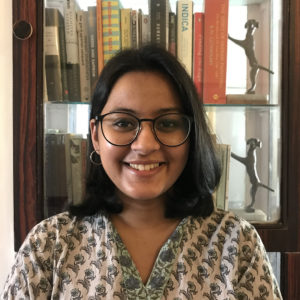
Where is your favorite place to read?
Although I mostly read in bed these days, my favorite places to read are in metros when I used to travel from one end of the city to the other—or lying on grassy lawns out in the sun. Mostly outdoors, so I have my own world to slip into as the world carries on.
You’re walking up the side of a mountain along a winding, wooded path. You look to your left and discover, by chance, a door in the side of the mountain. Do you open it, and if so, where does it lead?
I would open the door and when I opened it; it would take me back to the past, this moment in time when I was back in college and I used to spend my days and nights with the people who mattered to me the most. There would be lots of food and laughter and art and long walks and I would get moments to spare with everyone and it would feel as though it were a refresh button, from here on I would make some choices differently and some choices the same but I would be more open with my heart and treat time as it were a lot more precious.
How do you take your coffee? If you don’t drink coffee, describe your favorite beverage ritual.
Although I do like my coffee a lot sweeter and definitely cold, my favorite beverage ritual would be getting a glass of peach iced tea whenever I’m out with my friends or as a sweet break from too much work. But warm tea for winters.
What is your favorite English word and why? Do you have a favorite word in another language?
My favorite English word these days is warmth because it embraces everything that I could want from the world. There is warmth in kindness, in the company of people you love, in a song, in a memory, in every little thing that brings you comfort. Warmth is what we keep asking for from ourselves and from people to feel a lot less alone, to find strength to keep moving ahead. In another language, my friend says this word Insha’Allah a lot and there is this beautiful poem by Danusha Laméris on that word, and there is so much hope and resilience in that one word. We don’t know what is going to happen to us, if we’ll even find all the things we hope for, but this is a word that’s repeated like a prayer and there is a sense of acceptance and bravery in it. It might happen, it might not happen and that is okay—but we still hope it does.
You’re on a deserted island. You have one album and one book. What are they and why?
The one album that I will have is BTS’s Love Yourself: Answer. Even though my most favorite song is “Blue and Grey,” I will choose this one because it’s a compilation of all their songs in their journey of telling people to love themselves. There is so much hope, comfort, and strength in their music and what they’re trying to share about themselves. It makes you feel that it is possible to be that person who is soft, who is brave, more hopeful, and believes in themselves. But there is a sense of friendship too because they reiterate that in this journey, you’re not alone and they will be there too. When it comes to a book, it would be Remnants of a Separation by Aanchal Malhotra because it’s about loss and memory and storytelling and oral history and also it was the last gift that I was given by my most favorite person in this world before he passed away.
If you could change one thing about the literary industry, what would it be?
It’s an answer which has been said time and again, but I’ll still say it: to make it more accessible to people. There are too many restrictions when it comes to publishing your stories or even working in publishing. There are these constant set guidelines and those need to be broken down. Stories can be written differently, people who are passionate about storytelling and not exactly from a literary background can become a part of the publishing industry, if the drive is there, everyone should be given a chance. There’s nothing more beautiful than telling stories. The more stories that are out there, the more chances are given to people to share themselves, and the more we’ll learn about people and about ourselves.